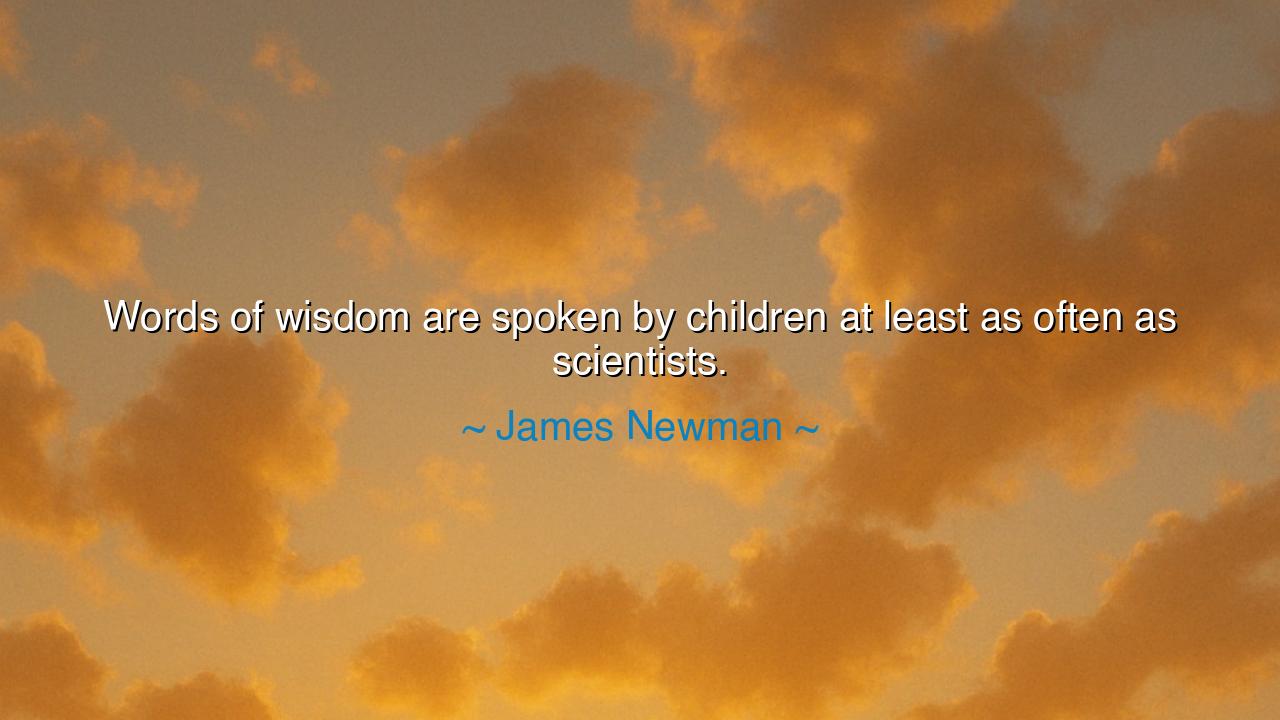
Words of wisdom are spoken by children at least as often as






Hearken, O children of the ages, to the tender yet profound words of James Newman, who reveals a truth often overlooked: that words of wisdom may spring forth not only from the seasoned minds of scientists, but also from the unguarded hearts of children. He teaches that wisdom is not the exclusive domain of scholarship or age, for insight can emerge from innocence as surely as from experience. The simplicity of a child’s vision often pierces illusions that the learned may overlook.
Newman reminds us that wisdom is not merely the product of intellectual mastery, but of clarity, wonder, and sincerity. Scientists, through careful observation and disciplined thought, uncover truths about the world. Yet, the spontaneous utterances of children, unburdened by bias or pretense, may reveal truths about life and the human spirit. Both voices are necessary, for one explores the universe through reason, and the other through the purity of unfiltered perception.
Consider the words of the young Anne Frank, whose diary during the darkness of war offered insights more profound than many scholarly works. Though merely a child, she spoke of hope, courage, and the enduring light of humanity amidst suffering. Her words, simple yet luminous, continue to inspire generations, proving that a child’s voice can carry wisdom equal to, or even greater than, that of the most accomplished scientist or philosopher.
Even in the realm of discovery, this principle holds true. Many scientific breakthroughs have begun with childlike curiosity—a question posed in innocence, a wonder untainted by assumption. The great physicist Albert Einstein himself once declared that imagination was more important than knowledge, for it is the source of discovery. In this way, the unguarded observations of children mirror the deepest insights of scientific exploration.
O children of the future, carry this teaching in your hearts: listen to the voices of the young as well as the learned. Do not dismiss the simple as foolish, nor exalt the complex as the sole bearer of truth. Wisdom resides in both the laughter of a child and the calculations of the scholar, for the universe speaks through many tongues. When you honor both, your understanding becomes whole, and you walk the path of harmony and insight.
In this balance of innocence and intellect, Newman’s words shine eternal: that true wisdom is not confined to age or expertise, but flows wherever hearts are open and minds are free.






Ppurple
Reading this quote makes me consider the ways in which adults might overlook obvious truths because of overthinking or preconceptions. Children, in their simplicity, often articulate ideas that resonate deeply yet seem obvious in hindsight. How can we train ourselves to listen more attentively and with less judgment to ideas that come from unexpected sources? Could this shift in perspective influence education, leadership, and problem-solving practices to embrace more holistic approaches?
MPNguyen Minh Phat
I find this perspective both charming and unsettling. It suggests that wisdom is not merely a product of study and research but can also emerge spontaneously from observation and genuine reflection. I wonder, though, how often we fail to recognize these moments of insight in children because we are conditioned to prioritize authority and credentials. Could fostering environments that value all voices, regardless of age, enhance learning and creativity?
HTHuyen Truong
This quote is thought-provoking because it challenges the assumption that wisdom is the domain of the learned or experienced. It makes me question how much value we place on curiosity, innocence, and direct observation, which children excel at. Are there areas of life where adults could benefit from unfiltered, childlike perspectives? How do we balance respect for expert knowledge with openness to unconventional insights from those we might consider less experienced?
LPLinh Linh Pham
Newman’s statement makes me reflect on how we often underestimate the insight of children. Is it possible that their simplicity and honesty allow them to express truths that adults, clouded by experience and bias, overlook? I wonder how society could create spaces that better listen to young voices. Could integrating children’s perspectives into decision-making or creative processes actually lead to wiser outcomes, or do we risk romanticizing their simplicity?